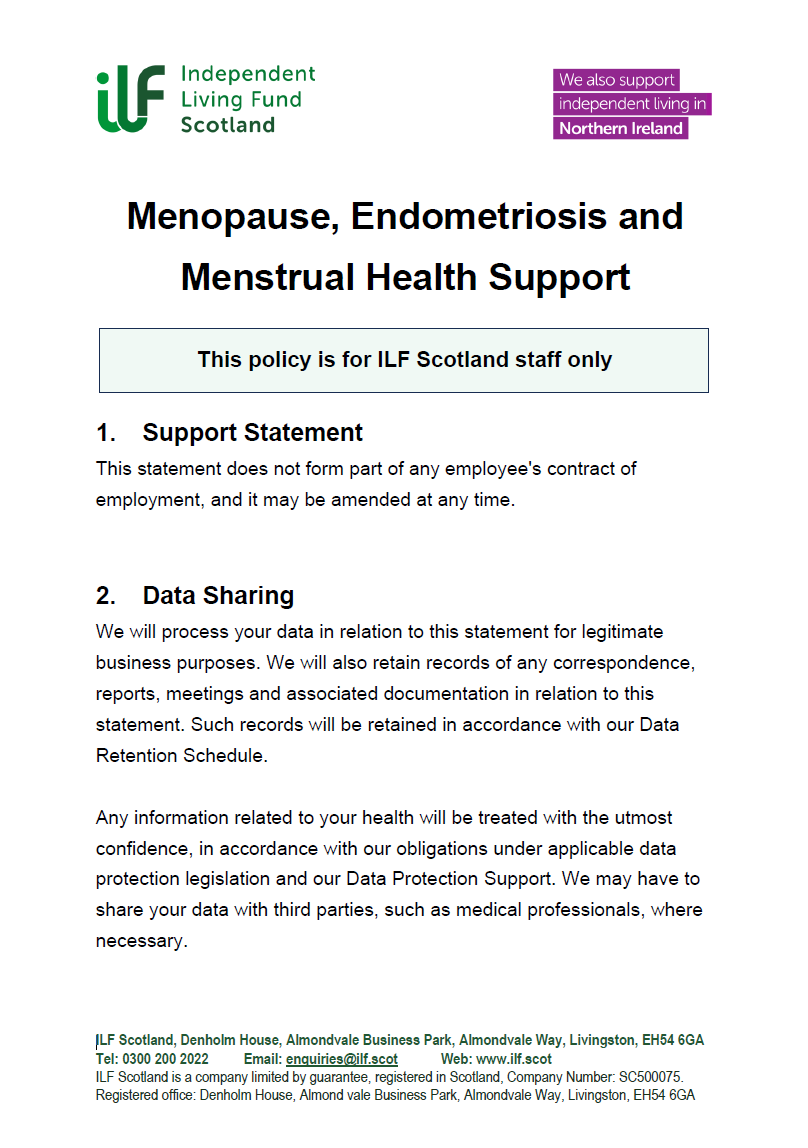
This statement does not form part of any employee's contract of employment, and it may be amended at any time.
We will process your data in relation to this statement for legitimate business purposes. We will also retain records of any correspondence, reports, meetings and associated documentation in relation to this statement. Such records will be retained in accordance with our Data Retention Schedule.
Any information related to your health will be treated with the utmost confidence, in accordance with our obligations under applicable data protection legislation and our Data Protection Support. We may have to share your data with third parties, such as medical professionals, where necessary.
ILF Scotland is committed to ensuring that all individuals are treated fairly and with dignity and respect in their working environment.
ILF Scotland is also committed to improving the wellbeing of its people. Following the Equality Act 2010, ILF Scotland will strive to make the workplace free from any form of discrimination.
In this regard, ILF Scotland will enable colleagues who are experiencing problematic periods or menopausal symptoms to get the support they need in order to manage their symptoms at work.
It is important that ILF Scotland understands the difficulties and anxieties of staff that may currently be going through this and that we manage this issue by raising awareness for all managers and colleagues.
The aim of this support and the manager’s guidance is to ensure managers have an awareness of menopause, endometriosis, and menstrual health-related issues and how they can affect our staff.
The aim is to create an environment where all colleagues feel able to be honest, raise issues about their symptoms and ask for adjustments at work.
We will take a pro-active stance by promoting a greater understanding of menopause, endometriosis and menstrual health and seek to remove any exclusionary or discriminatory practice.
The support and guidance will provide direction and clarity on how we may deal with these issues, either for individuals experiencing this life condition or those who are perhaps affected indirectly, for example, line managers, partners, and colleagues.
Appropriate information and support to be made available to staff with regards to the menopause, endometriosis, and menstrual health.
Work conditions will be reviewed to take account of the difficulties that colleagues may experience during the menopause, or when living with endometriosis or problematic menstrual health.
Reasonable adjustments will be considered where necessary.
Raise awareness to ensure that all staff feel supported and comfortable when discussing these topics in the workplace.
As required, risk assessments can be used to support staff during the menopause, endometriosis, and menstrual health
The menopause is part of the ageing process for women when their natural oestrogen levels fall and when periods have ceased for twelve consecutive months. Some women experience a medical or surgical menopause which can occur suddenly when the ovaries are damaged or removed by specific treatments such as chemotherapy, radiotherapy or surgical hysterectomy.
Menopause that naturally occurs before the age of 40 is known as premature menopause and before the age of 45, early menopause. It is important to note that the menopause has many phases. Around 1 in 100 women experience the menopause before 40 years of age. This is known as premature menopause or premature ovarian insufficiency.
Perimenopause or menopause transition can begin several years before the menopause and is the phase where the ovaries stop producing eggs and periods can be altered or absent due to a reduction in the hormone, oestrogen. During this phase, many may experience symptoms the same as those that occur during the menopause.
The next phase is the menopause when periods stop altogether. This can begin between the ages of 45 and 55. In the UK, the average age for a woman to reach the menopause is 51. Some people will experience it at a younger age as outlined above and some symptoms may be experienced over varying lengths of time.
The phase after the menopause has ended is known as post-menopause. Symptoms are likely to continue, on average, for four years from the person’s last period but may continue for a number of years beyond that. There is potentially an increased risk of certain conditions such as heart disease and osteoporosis during post-menopause because of lower levels of certain hormones. These risks are higher for those who have had an early or premature menopause.
For many people, the menopause can result in physical, psychological, and emotional symptoms, which may include:
The above list is not exhaustive, and it is important to note that not everyone will experience symptoms during this time. For those that do, the type, amount and severity of symptoms can vary, ranging from mild to severe. Employees may wish to seek advice from their GP if their symptoms are having an impact on their daily lives. Some people may experience an impact on their cognitive functions for example, being unable to remember things; loss of confidence; inability to readily find the right word to express thoughts; having thoughts completely disappear mid-sentence. It may become temporarily more difficult for them to carry out certain tasks and that performance is affected. These are symptoms that people might not associate with the menopause.
There are other circumstances in which symptoms may be experienced:
Whilst menopause is usually a process involving gradual change, it can sometimes be sudden and acute following serious illness, medication, or surgery. People experiencing sudden menopause tend to experience more severe symptoms and may require treatment and / or post-operative care to manage further problems.
Younger women undergoing treatment for conditions such as the following may experience menopausal symptoms whilst receiving treatment:
The effects on a woman’s physical, psychological, and emotional health can significantly impact on her ability to carry out her work along with her relationships with colleagues.
ILF Scotland recognises its responsibility to take into account any difficulties women may experience during the menopause and aims to provide support and advice in this regard.
If you are at all apprehensive about discussing any menopausal issue with your line manager- we encourage you to speak with HR in the first instance for guidance and support.
Endometriosis is a condition where cells similar to the ones in the lining of the womb are found elsewhere in the body. These cells react to the menstrual cycle each month and also bleed. However, there is no way for this blood to leave the body. This can cause inflammation, pain and the formation of scar tissue.
Endometriosis can affect you from puberty to menopause, although the impact may be felt for life.
It's a long-term condition that can have a significant impact on a person’s life, but there are treatments that can help to make symptoms more manageable.
The most common symptoms are:
Symptoms may be associated with a person’s period or a certain point in the menstrual cycle rather than being continual. The person may also experience heavy periods.
For some, endometriosis can have a big impact on their life and may sometimes lead to feelings of depression.
Menstruation (also known as a period and many other colloquial terms) is the discharge of blood and mucosal tissue from the inner lining of the uterus through the vagina. The menstrual cycle is characterised by the rise and fall of hormones. Menstruation is triggered by falling progesterone levels and is a sign that pregnancy has not occurred.
Periods usually begin at around the age of 12, although some girls will start them earlier or later. Menstruation will continue until a woman reaches menopause.
Pre-Menstrual Syndrome (PMS) is the name given to symptoms experienced in the weeks before a period. Symptoms of periods can include:
